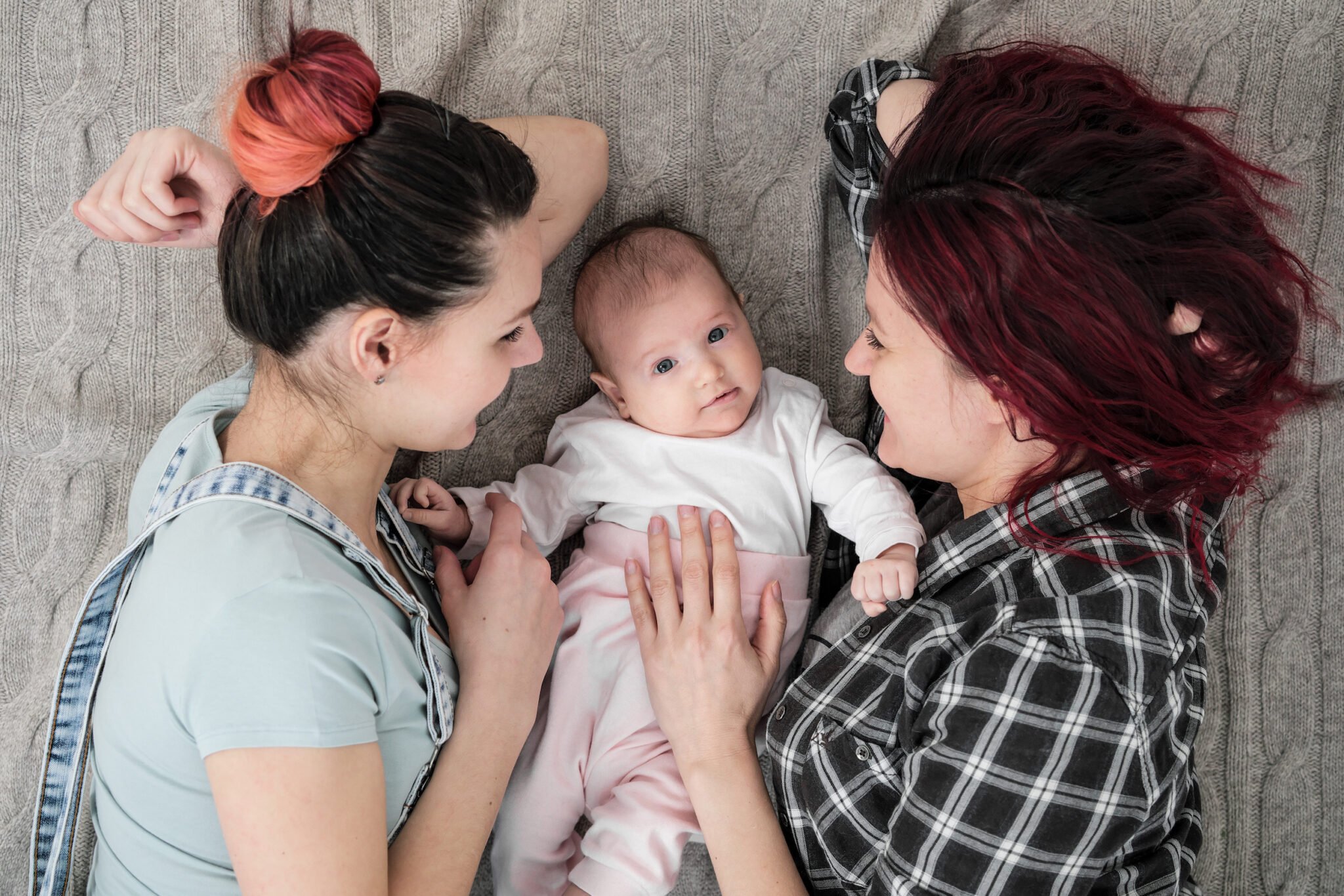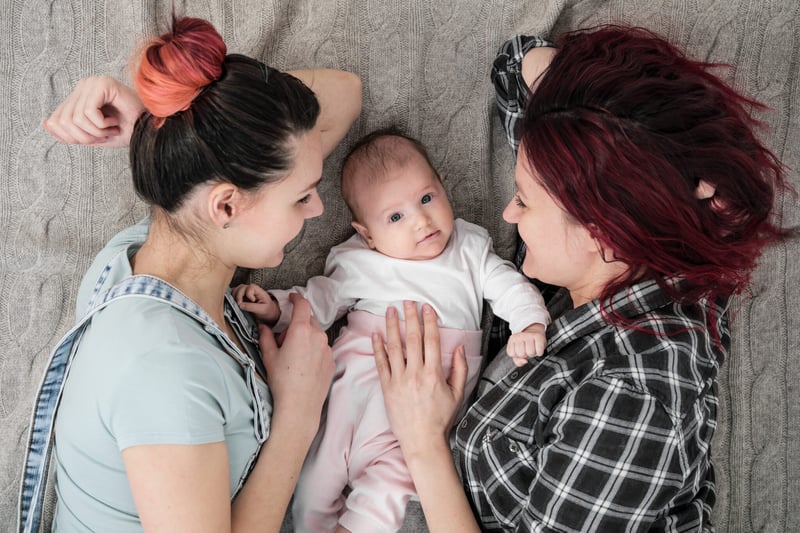 LGBTQ Parenthood Can Be a Journey of Self-Discovery"
class="bg-img"
fetchpriority="high"
loading="eager"
decoding="async">
LGBTQ Parenthood Can Be a Journey of Self-Discovery"
class="bg-img"
fetchpriority="high"
loading="eager"
decoding="async">
Written By: Jacalyn Finerty on November 18, 2020
 Helping LGBTQ partners build a family is a passion for our providers. While heterosexual and LGBT couples start fertility and family planning in similar fashion, there are specific questions and concerns for those using third-party donor eggs, sperm and embryos. Jacalyn (Jackie) S. Finnerty, MS, APRN, WHNP-BC, explains.
Helping LGBTQ partners build a family is a passion for our providers. While heterosexual and LGBT couples start fertility and family planning in similar fashion, there are specific questions and concerns for those using third-party donor eggs, sperm and embryos. Jacalyn (Jackie) S. Finnerty, MS, APRN, WHNP-BC, explains.
I’ve been working at Women & Infants Hospital for more than 22 years – about half my life! I have worked in many areas of women’s health at the hospital, from nursing in labor and delivery, reproductive endocrinology, the operating room and education. In furthering my education, my goal was to rejoin the reproductive endocrinology team as nurse practitioner (NP). The fertility center brings all those specialties, and my experience within them, together. My biggest joy is sending patients off with their new families. It’s an amazing experience!
I have had the good fortune to work with single women, heterosexual couples and LGBTQ couples on their fertility and family planning journeys. While much of what LGBTQ parents-to-be experience in fertility treatment is identical to heterosexual parents, there is also an element of self-reflection and additional testing that is very unique to this population.
The first few steps in building a fertility treatment plan are pretty much the same for everybody. For the LGBTQ population without infertility issues, the treatments serve more as reproductive services.
For LGBTQ couples or anyone who may use donor or third-party services, a little more attention is paid to screen and counsel for some specific concerns.
Cytomegalovirus (CMV) is a virus that’s part of the herpes family. When an adult contracts CMV, the symptoms mirror those of the common cold, so many people don’t even know when or if they have had it. The Centers for Disease Control and Prevention (CDC) reports that more than 50% of adults contract CMV by age 40. The virus remains alive but dormant in the body after symptoms subside. The danger with this virus is mostly to the unborn baby exposed in-utero.
Both donor and recipient parents must be tested for this virus because it causes birth defects and long-term health problems for in-utero babies. Approximately 1 in every 200 babies are born with congenital CMV infection, according to the CDC.
If a sperm donor was exposed to CMV in the past, the virus could theoretically still live in the sperm. That means for a carrying parent who has never contracted CMV the ideal donor would be someone who’s tested negative for the virus. If the mother has been exposed to CMV in her life and tests positive for antibodies, then the sperm can come from a donor who’s tested either positive or negative. Of note, egg donors are not tested for CMV since the egg is not considered a hospitable environment for this virus.
Some of the most meaningful moments of determining LGTBQ pregnancy options are the times I get to spend talking with patients about who’s going to carry the pregnancy. What prompted a partner to decide to carry versus not? Is one partner in better physical health? Sometimes it’s a strong desire.
With everyone’s unique health circumstances and desires in mind, there are many options available for these couples. In many cases, one partner chooses to carry the first pregnancy, then when the couple returns for a subsequent pregnancy, the other partner may choose to carry.
Once in a while, reciprocal in vitro fertilization (IVF) is chosen, where the eggs from one partner are paired with sperm to form embryos. These embryos are then implanted in the partner who desires to carry the pregnancy.
For LGBTQ couples and anyone seeking donor assistance in our clinic, we require at least one meeting with our social worker. Whether the donor material is eggs, sperm or both, there are many legal and emotional considerations that need to be addressed in advance.
The LGBTQ parents-to-be may have unique circumstances to discuss, such as when and how to explain to the children where they came from. There are also complex societal issues, such as the potential for discrimination and stereotyping. Family acceptance is another big one.
In the counseling session, the social worker will review Rhode Island’s Equal Parenting Act. The counselor will also address how to talk to a child in the future about how they were conceived and the couple’s strong desire for them.
Choosing a sperm donor may be challenging, and our social worker can help you with this process. Recommendations about how to choose a sperm bank, as well as a sperm donor, are discussed.
This conversation includes what additional considerations may be important to the couple, such as considering an open donor (one whose identity can be released once the child is an adult), a donor who would be willing to disclose health information as it arises, and inquiring about a limit to the number of offspring one donor can have.
Perhaps one of the most important topics to discuss is the legal aspect of third parties. I always ask patients if they’ve thought about the legal implications and potential custody issues when working with third-party donors, in particular known donors. There must be a proper contract in place that outlines each party’s rights so everyone is protected.
I highly advise LGBTQ couples not to seek or purchase donor material without talking with their provider first. As practitioners, it’s our job to help patients find the best path toward pregnancy while taking into account all personal considerations of the intended parents.
There are many important questions to consider before purchasing sperm.
Keep in mind that each assisted fertility cycle requires at least one vial of sperm, and the approximate cost of a vial is about $1,000. We recommend purchasing a minimum of two vials per cycle to be on the safe side. Shipping costs may also be a factor and should be considered while purchasing sperm.
Related reading: How Sandra & Meredith found success with donor sperm and IUI
It’s also important not to pick (or purchase) sperm from the first donor who matches the vision in your mind. It’s fun to look through the pictures at a sperm bank with thoughts like, I want him to look like a certain celebrity, or I want him to be tall with green eyes. But those may not be the ultimate criteria.
I recommend asking these kinds of questions:
First off, investigate your insurance coverage and financial means. Some insurance plans do not cover fertility services, and if they do, may have certain criteria. Not every cycle works the first time around. Donor tissue, lab tests and medications – the costs for those can add up very quickly. Providers will want to build a fertility plan that is both comfortable for you and works within your parameters.
Second, find a provider you are comfortable with. Talk openly with the person to review your goals and wishes in building a family. Discuss things like who wants to carry, what things mean more than others (e.g. known or anonymous sperm), and any time frame concerns.
Look at all the family planning and pregnancy options available within your comfort level and budget. If there is anything you’re nervous about, talk about it! It’s crucial to be open and honest with each other and the care team.
Lastly, don’t get frustrated. There’s a lot of planning involved, and treatments take time. The prep work alone, such as the work-up testing or waiting out the known donor quarantine, can be trying.
Be aware that the process is not always successful. Different approaches may feel like starting from scratch, however, they are more like building blocks to becoming a parent. You and your partner are not alone in this journey toward building your family. We will help in finding the right route for you!
Disclaimer: The content in this blog is for informational and educational purposes only and should not serve as medical advice, consultation, or diagnosis. If you have a medical concern, please consult your healthcare provider or seek immediate medical treatment.
Send Us A Message
90 Plain Street,
Providence, RI 02903
Copyright © 2026 Care New England Health System